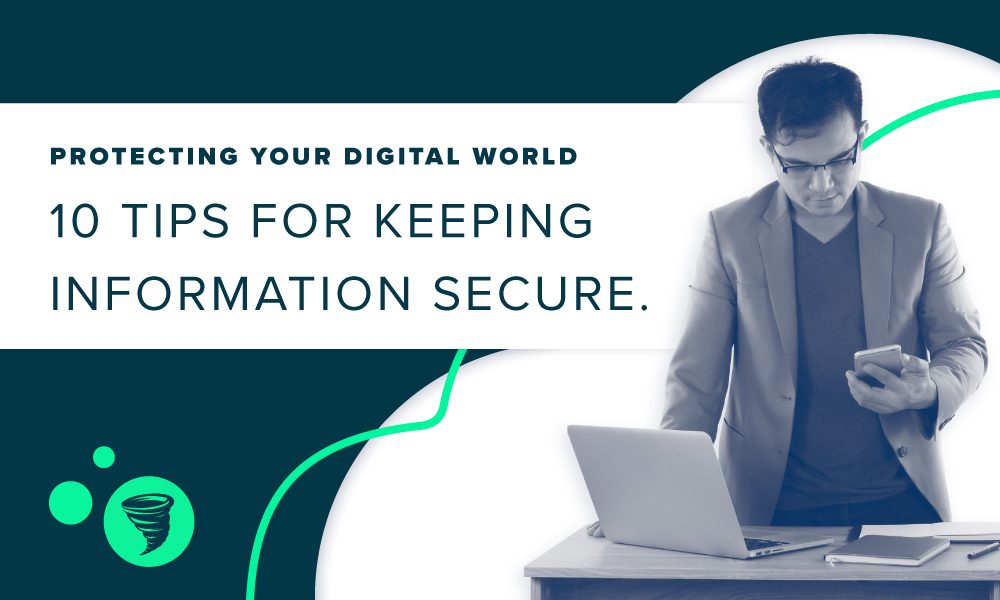At Big Storm, we believe offering the best services means more than just providing exceptional marketing solutions. We prioritize our clients’ best interests, especially when keeping information secure for them.
We recognize that our clients sometimes have sensitive data they’d like to incorporate on their website or social media channels. Sensitive data is confidential information your business stores online that should only be accessed by you or your employees. This information could involve payment details, dates of birth, or even confidential business information.
You and your customers’ data is valuable, so we approach the task of securing your sensitive data seriously. Taking deliberate measures to keep your information secure reduces the chances of identity theft, stolen bank information, spam, phishing, and other cybercrimes that could impact your business’s success. This is why we review and assess internally whether the information we publish might pose any security risks.
We firmly believe that safeguarding your information is key to building long-lasting relationships with you. When you entrust us with your data, you can have peace of mind knowing we’ll keep it secure and use it ethically. If you request that we include sensitive information on your site, we’ll discuss the potential risks and ensure it’s a wise decision.
Collaboration is key with any great partnership, so we want our clients to feel confident on how they can take measures to protect their company’s sensitive data, as well. Our team pulled together a collection of our top tips for how you can keep your business’s information secure. We want the online terrain to feel less like a minefield for you and more like a place you can run your business safely and successfully. Read our recommended steps below!
10 Tips for Keeping Information Secure
1. Use strong, unique passwords
Create complex passwords that combine uppercase and lowercase letters, numbers, and special characters. Avoid using the same password across multiple accounts, as this makes it easier for hackers to gain access to multiple platforms. One of the best ways to adhere to this is by using a secure password application such as 1Password.
2. Enable two-factor authentication (2FA)
Enable 2FA on all accounts that offer this feature. It adds an extra layer of security by requiring a secondary form of verification (such as a text message or a mobile app) before granting access to your account.
3. Keep software and devices up to date
Regularly update your operating system, applications, and antivirus software. These updates often include security patches that help protect your devices and data from newly discovered threats.
4. Be cautious with public Wi-Fi
Avoid using public Wi-Fi networks for sensitive activities, such as online banking or accessing sensitive data. If you must use a public network, use a virtual private network (VPN) to encrypt your connection and protect your data from potential eavesdropping.
5. Beware of phishing scams
Always be cautious with unsolicited emails, texts, or calls asking for personal information or urging you to click on suspicious links. Verify the source of the communication before providing any information or clicking any links.
6. Secure your home network
Change the default password for your router and enable WPA2 or WPA3 encryption to help protect your Wi-Fi network from unauthorized access. Disable remote management features and guest networks when not in use.
7. Regularly back up your data
Create regular backups of your important files and store them in a secure location, such as an external hard drive or a cloud storage service. This ensures that you can recover your data in case of a ransomware attack or system failure.
8. Limit the information you share online, over email, and SMS
Be mindful of the information you post on social media and other public platforms. Cybercriminals can use personal details found online to craft targeted phishing attacks or guess security answers.
9. Use encryption
Encrypt sensitive files and emails to protect them from unauthorized access. Many modern email services and messaging apps offer built-in encryption options.
10. Educate yourself and others
Stay informed about the latest cyber threats and security best practices. Share this knowledge with friends, family, and colleagues to help create a safer online environment for everyone.
Keep Your Information Safe & Marketing Efforts Smooth
As a digital marketing agency, we focus on more than just delivering solutions; we build relationships. We know you need a partner who is committed to your success, and that’s precisely what we offer. Whether you want to boost your brand visibility or generate more leads, we’ll be by your side, supporting you every step of the way to help you reach your goals.
If you’re searching for a marketing firm that truly puts your needs first, look no further. Contact Big Storm today to learn more about how we can help your business grow while keeping your information safe. We can’t wait to collaborate with you!

